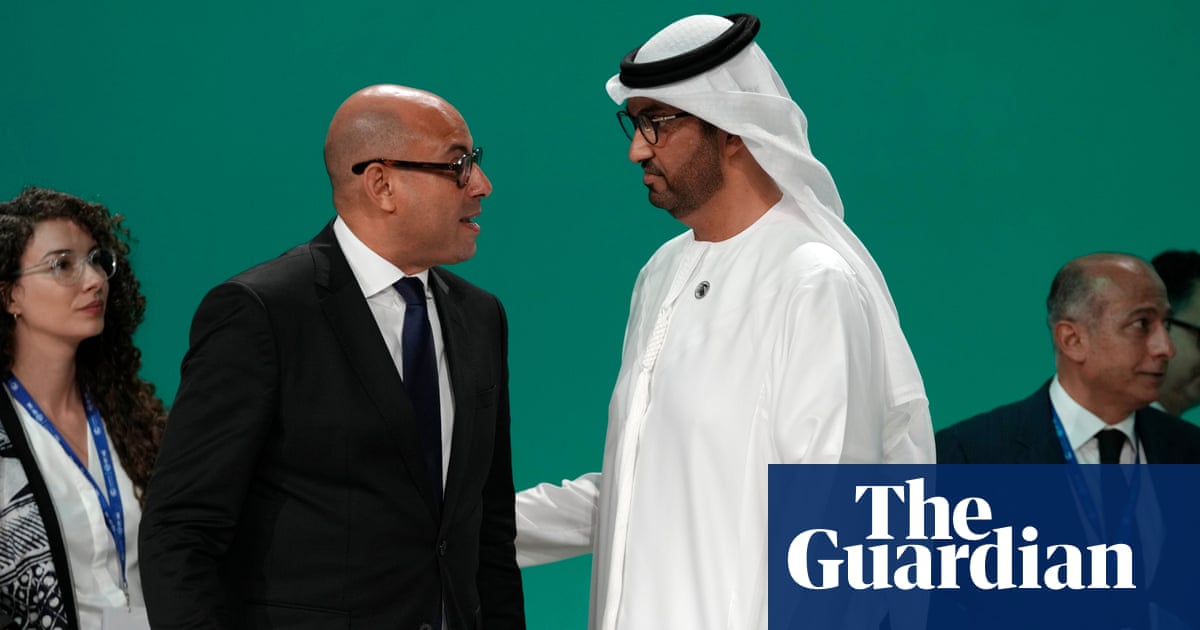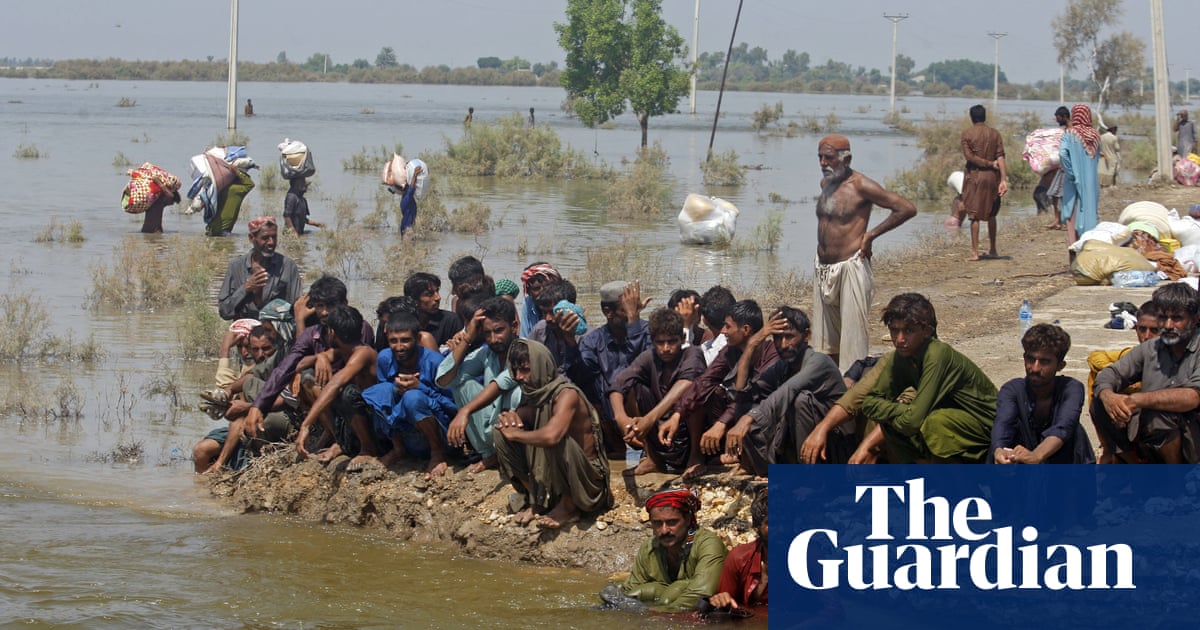
A landmark deal to help the world’s poorest and most vulnerable countries pay for the irreversible impacts of climate disaster was agreed on the first day of the Cop28 UN summit.
The agreement was met with a standing ovation from delegates.
Host country UAE and Germany both pledged $100m (£79m) to the loss and damage startup fund, which will aim to keep up with the rising costs caused by extreme weather and slow-onset disasters such as sea level rise, ocean acidification and melting glaciers.
Germany’s development minister, Svenja Schulze, said: “Germany and the United Arab Emirates are jointly leading the way. At the same time, we are jointly calling on all countries that are willing and able to make contributions of their own to the new fund responding to loss and damage. In this way, we are building bridges between traditional donor countries and new, non-traditional donors. After all, many countries that were still developing countries 30 years ago can now afford shouldering their share of responsibility for global climate-related loss and damage.”
The initial funding is close to US$429m. €225m ($245m) will come from the EU, including US$100m from Germany. There is also £60m ($75m) from the UK, $24.5m from the US and $10m from Japan. The funding will be a much-needed boost for the agreement, as the loss and damage resolution does not mention scale or the replenishment cycle, which climate justice advocates say raises questions about the fund’s long-term sustainability.
The UAE is likely to see this as a major win for its presidency, as the two-week climate conference kicks off amid controversy over the country’s oil and gas expansion plans. Adnoc, the UAE national oil company, boasted $802m in net profits last year – a 33% rise from 2021. Sultan Al Jaber is president of both Cop28 and Adnoc.
Simon Stiell, executive secretary to the UNFCCC, said: “Today’s news on loss and damage gives this UN climate conference a running start on governments, and their negotiators must use this as a mentor to deliver truly ambitious outcomes here in Dubai. We must keep our eyes on the prize and every minute counts.” Al Jaber said: “I am more confident than ever that we will deliver an unprecedented result.”
Ghiwa Nakat, the executive director of Greenpeace Mena (Middle East and North Africa), said: “This is the kind of leadership we expect from the host country and we urge other countries to follow suit. Rich developed countries must step up with major contributions to the new fund, and polluting industries must also be made to pay. If the Cop presidency can build on this with a consensus agreement on a just phasing out of fossil fuels, Cop28 will indeed be an historic event.”
Pressure will now be on other rich nations to announce contributions as world leaders take to the stage on Friday and Saturday.
The loss and damage in developing countries is already estimated by some studies to be greater than $400bn annually – and expected to rise – so time is of the essence. Going forward, loss and damage costs will depend on the effectiveness of climate mitigation and adaptation efforts.
The blueprint for the new agreement will involve setting up a fund under the auspices of the World Bank at first, able to disburse money to developing countries and funded by rich industrialised nations, emerging economies and fossil fuel producing countries, such as China, Gulf states and the Cop28 host country, the United Arab Emirates.
Avi Persaud, an adviser to Mia Mottley, the prime minister of Barbados, said: “This is a hard-fought historic agreement. It shows recognition that loss and damage is not a distant risk but part of the lived reality of almost half the world’s populations and that money is needed to reconstruct and rehabilitate if we are not to let the climate crisis reverse decades of development in moments.”
Christian Aid has welcomed the operationalisation of the loss and damage fund at Cop28 but warned there is much work to be done to ensure the climate vulnerable were able to get access to it. Mariana Paoli, the charity’s global advocacy lead, said: “It’s a testament to the determination of developing country negotiators that we now already have the fund agreed and established.
“The fact that the World Bank is to be the interim host of the fund is a worry for developing countries. It needs to be closely scrutinised to ensure vulnerable communities are able to get easy and direct access to funds and the whole operation is run with far more transparency than the World Bank normally operates on. These were the conditions agreed by countries and if they are not kept to, a separate arrangement will be needed.”
Mohamed Adow, the director of Power Shift Africa, said it was “great” to see the loss and damage fund established but that the initial funding pledges were “clearly inadequate”. “[It] will be a drop in the ocean compared to the scale of the need they are to address. In particular, the amount announced by the US is embarrassing for President Biden and John Kerry.”
Though the loss and damage text was adopted on Thursday, technically all texts are still not final until the gavel comes down at the end of the conference, which is scheduled to be on 12 December.
More than 160 heads of state are expected to arrive for a grand ceremony on Friday, where the UK’s King Charles III will make an opening speech, alongside the UN secretary general, António Guterres, and the president of the United Arab Emirates, Sheikh Mohammed bin Zayed Al Nahyan. The UK prime minister, Rishi Sunak, will attend, along with the leaders of major developing countries including Brazil’s Luiz Inácio Lula da Silva and India’s Narendra Modi. Joe Biden and Xi Jinping are not attending, but their climate envoys will play a key role at the summit.
Much of the next 10 days will be taken up with talks on how to prevent global heating from exceeding the vital limit of 1.5C (2.7F) above preindustrial levels, after the hottest year humanity has experienced.
Gaston Browne, the prime minister of Antigua, said: “This year’s heat is demonstrating what small island developing states have been saying all along and that is 1.5C is not going to be easy, and so we cannot pat ourselves on the back and say we did good to finally agree on this. The earth is warming, and as it continues to warm, it will cause pain and suffering and more importantly this is happening faster than we expected. We all have to stop burning fossil fuels at the pace we are currently doing and start planting trees as if our lives depend on it.”
Cop28: Can fossil fuel companies transition to clean energy?
On Tuesday 5 December, 8pm-9.15pm GMT, join Damian Carrington, Christiana Figueres, Tessa Khan and Mike Coffin for a livestreamed discussion on whether fossil fuel companies can transition to clean energy. Book tickets here or at theguardian.live











